2024-2025学年人教版英语八年级上册Unit1 Where did you go on vocation?知识点讲解及练习(含解析)
文档属性
| 名称 | 2024-2025学年人教版英语八年级上册Unit1 Where did you go on vocation?知识点讲解及练习(含解析) | 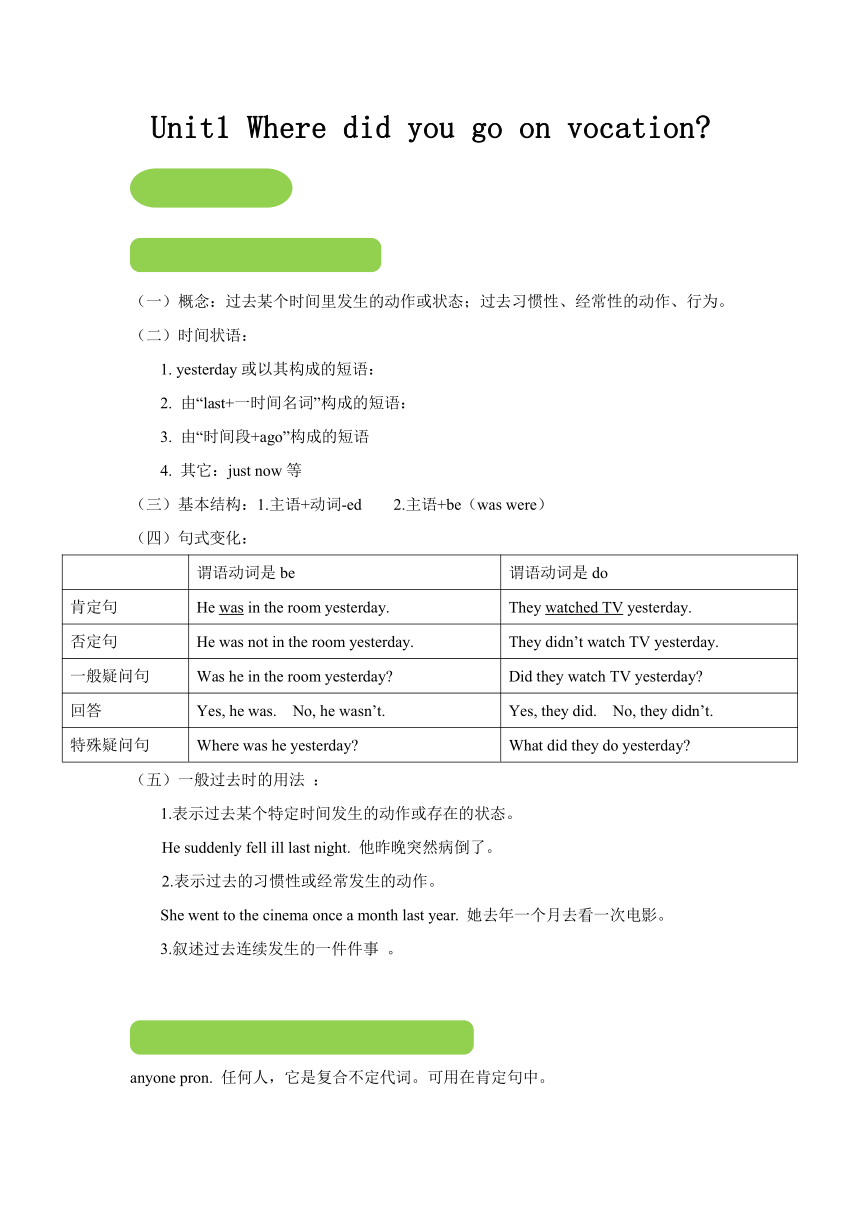 | |
| 格式 | docx | ||
| 文件大小 | 89.1KB | ||
| 资源类型 | 教案 | ||
| 版本资源 | 人教新目标(Go for it)版 | ||
| 科目 | 英语 | ||
| 更新时间 | 2024-07-09 17:51:24 | ||
图片预览

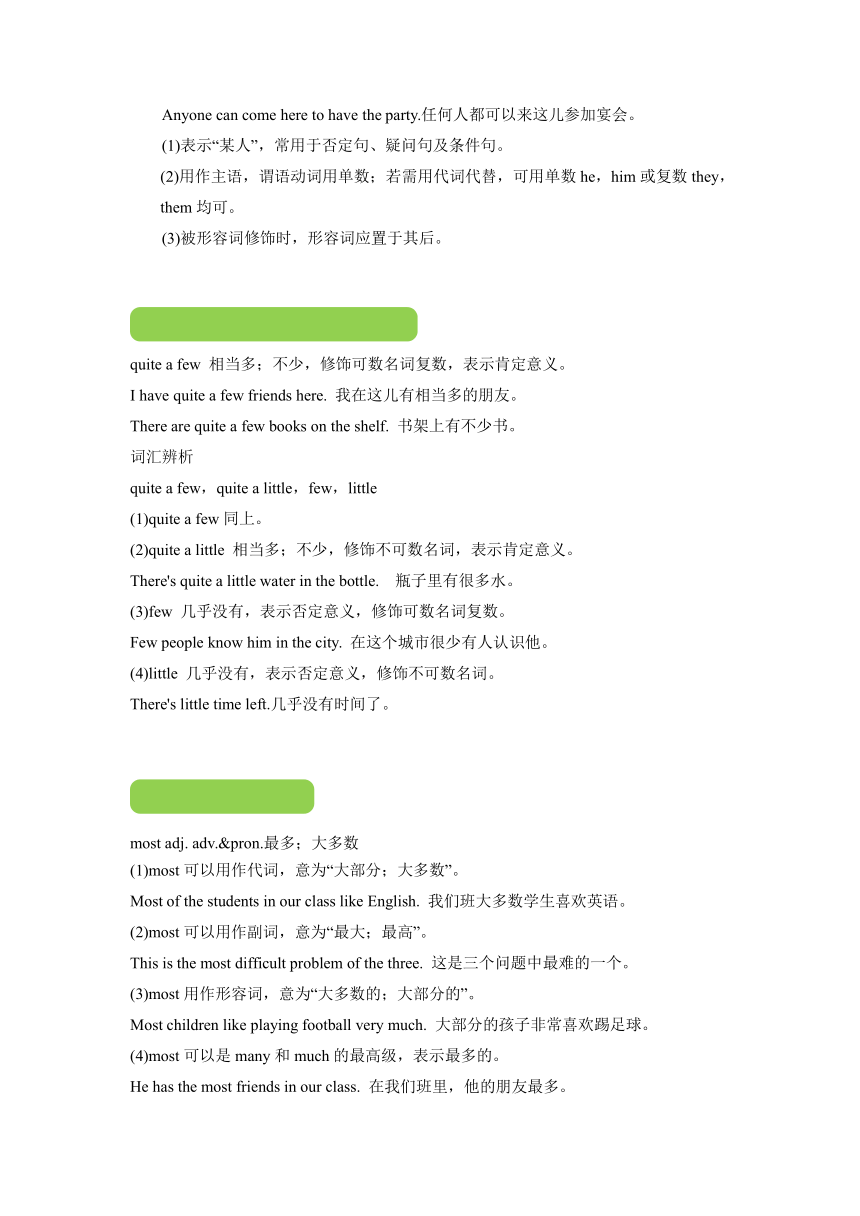
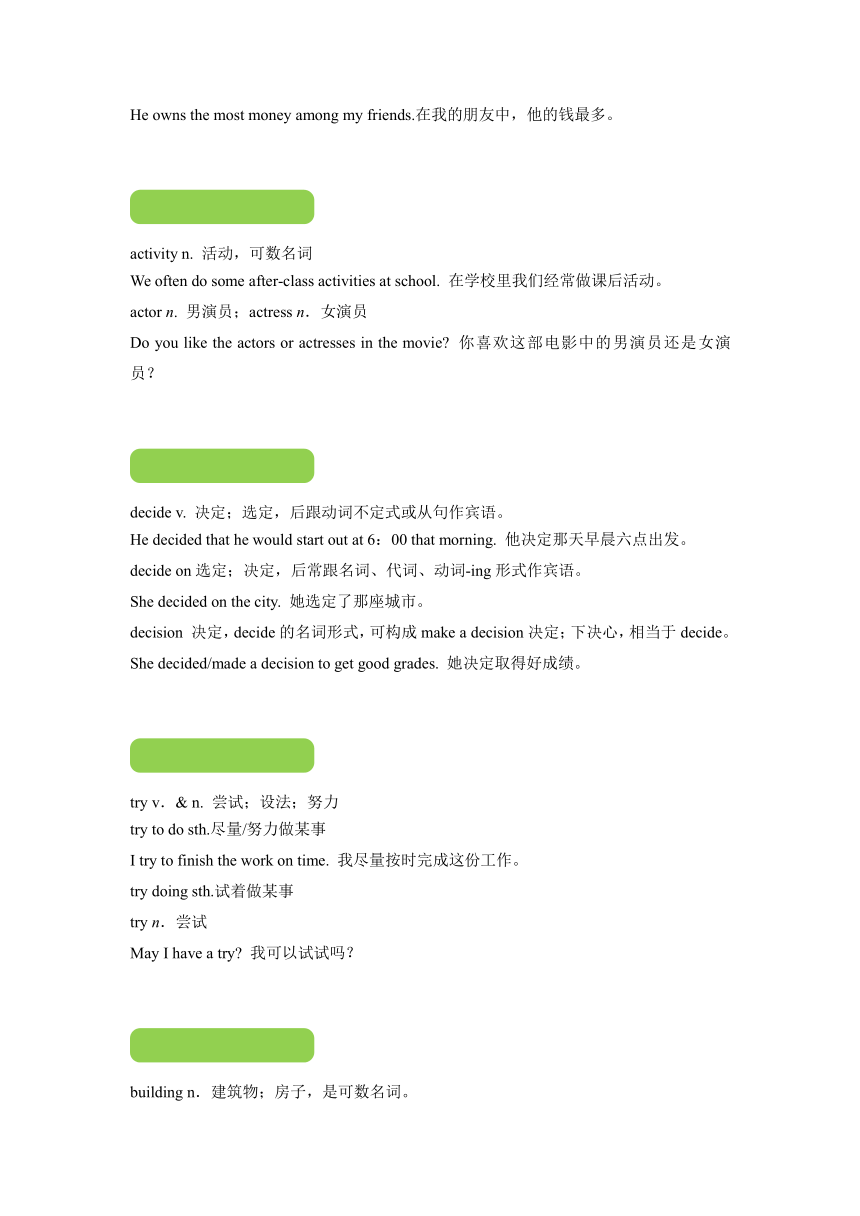
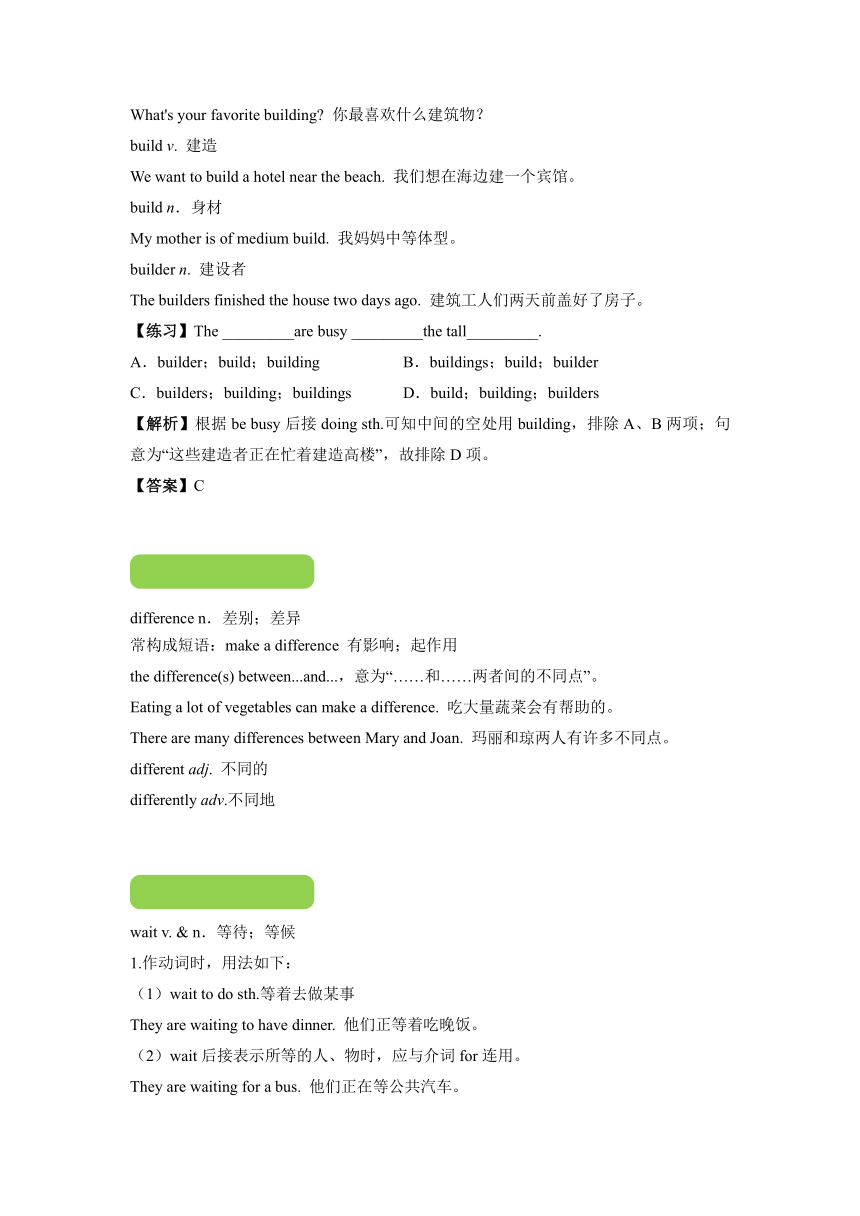
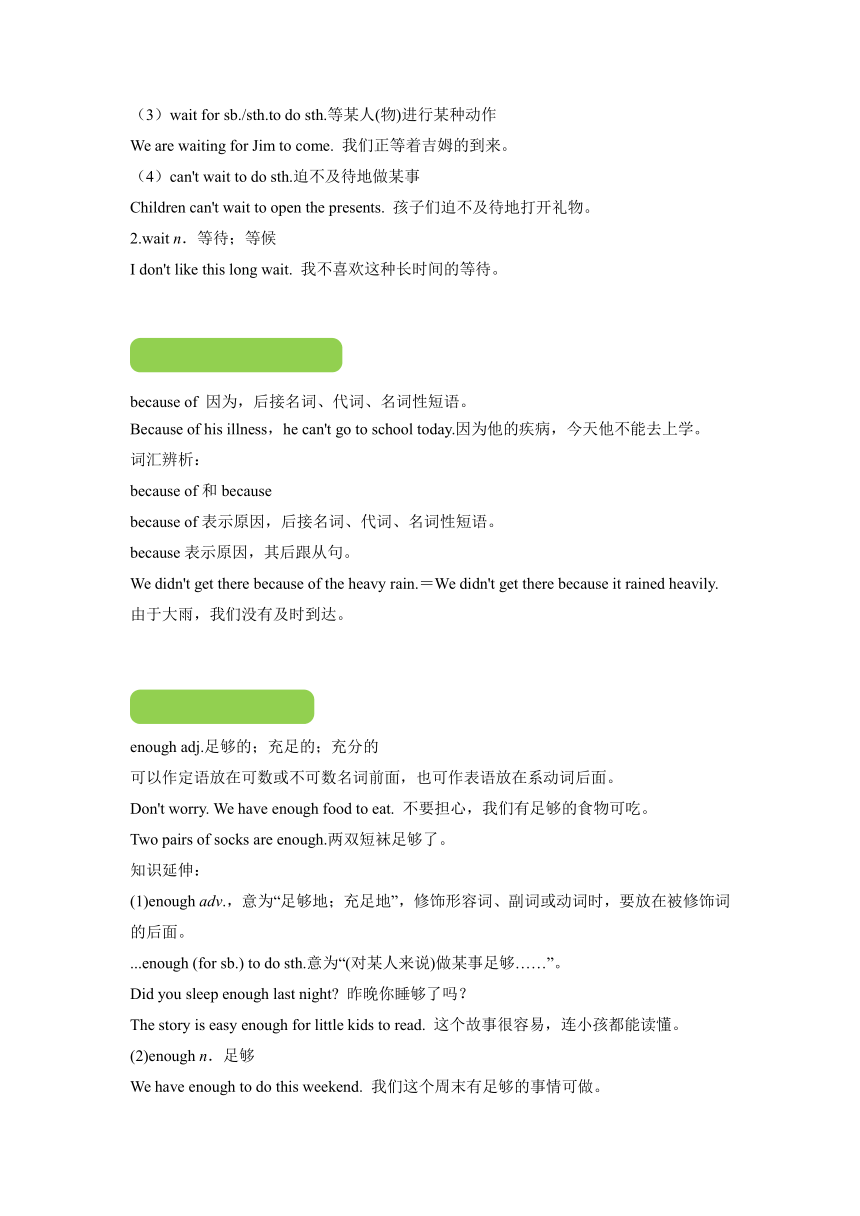
文档简介
Unit1 Where did you go on vocation
(一)概念:过去某个时间里发生的动作或状态;过去习惯性、经常性的动作、行为。
(二)时间状语:
1. yesterday或以其构成的短语:
2. 由“last+一时间名词”构成的短语:
3. 由“时间段+ago”构成的短语
4. 其它:just now等
(三)基本结构:1.主语+动词-ed 2.主语+be(was were)
(四)句式变化:
谓语动词是be 谓语动词是do
肯定句 He was in the room yesterday. They watched TV yesterday.
否定句 He was not in the room yesterday. They didn’t watch TV yesterday.
一般疑问句 Was he in the room yesterday Did they watch TV yesterday
回答 Yes, he was. No, he wasn’t. Yes, they did. No, they didn’t.
特殊疑问句 Where was he yesterday What did they do yesterday
(五)一般过去时的用法 :
1.表示过去某个特定时间发生的动作或存在的状态。
He suddenly fell ill last night. 他昨晚突然病倒了。
2.表示过去的习惯性或经常发生的动作。
She went to the cinema once a month last year. 她去年一个月去看一次电影。
3.叙述过去连续发生的一件件事 。
anyone pron. 任何人,它是复合不定代词。可用在肯定句中。
Anyone can come here to have the party.任何人都可以来这儿参加宴会。
(1)表示“某人”,常用于否定句、疑问句及条件句。
(2)用作主语,谓语动词用单数;若需用代词代替,可用单数he,him或复数they,them均可。
(3)被形容词修饰时,形容词应置于其后。
quite a few 相当多;不少,修饰可数名词复数,表示肯定意义。
I have quite a few friends here. 我在这儿有相当多的朋友。
There are quite a few books on the shelf. 书架上有不少书。
词汇辨析
quite a few,quite a little,few,little
(1)quite a few同上。
(2)quite a little 相当多;不少,修饰不可数名词,表示肯定意义。
There's quite a little water in the bottle. 瓶子里有很多水。
(3)few 几乎没有,表示否定意义,修饰可数名词复数。
Few people know him in the city. 在这个城市很少有人认识他。
(4)little 几乎没有,表示否定意义,修饰不可数名词。
There's little time left.几乎没有时间了。
most adj. adv.&pron.最多;大多数
(1)most可以用作代词,意为“大部分;大多数”。
Most of the students in our class like English. 我们班大多数学生喜欢英语。
(2)most可以用作副词,意为“最大;最高”。
This is the most difficult problem of the three. 这是三个问题中最难的一个。
(3)most用作形容词,意为“大多数的;大部分的”。
Most children like playing football very much. 大部分的孩子非常喜欢踢足球。
(4)most可以是many和much的最高级,表示最多的。
He has the most friends in our class. 在我们班里,他的朋友最多。
He owns the most money among my friends.在我的朋友中,他的钱最多。
activity n. 活动,可数名词
We often do some after class activities at school. 在学校里我们经常做课后活动。
actor n. 男演员;actress n.女演员
Do you like the actors or actresses in the movie 你喜欢这部电影中的男演员还是女演员?
decide v. 决定;选定,后跟动词不定式或从句作宾语。
He decided that he would start out at 6:00 that morning. 他决定那天早晨六点出发。
decide on选定;决定,后常跟名词、代词、动词 ing形式作宾语。
She decided on the city. 她选定了那座城市。
decision 决定,decide的名词形式,可构成make a decision决定;下决心,相当于decide。
She decided/made a decision to get good grades. 她决定取得好成绩。
try v.& n. 尝试;设法;努力
try to do sth.尽量/努力做某事
I try to finish the work on time. 我尽量按时完成这份工作。
try doing sth.试着做某事
try n.尝试
May I have a try 我可以试试吗?
building n.建筑物;房子,是可数名词。
What's your favorite building 你最喜欢什么建筑物?
build v. 建造
We want to build a hotel near the beach. 我们想在海边建一个宾馆。
build n.身材
My mother is of medium build. 我妈妈中等体型。
builder n. 建设者
The builders finished the house two days ago. 建筑工人们两天前盖好了房子。
【练习】The _________are busy _________the tall_________.
A.builder;build;building B.buildings;build;builder
C.builders;building;buildings D.build;building;builders
【解析】根据be busy后接doing sth.可知中间的空处用building,排除A、B两项;句意为“这些建造者正在忙着建造高楼”,故排除D项。
【答案】C
difference n.差别;差异
常构成短语:make a difference 有影响;起作用
the difference(s) between...and...,意为“……和……两者间的不同点”。
Eating a lot of vegetables can make a difference. 吃大量蔬菜会有帮助的。
There are many differences between Mary and Joan. 玛丽和琼两人有许多不同点。
different adj. 不同的
differently adv.不同地
wait v. & n.等待;等候
1.作动词时,用法如下:
(1)wait to do sth.等着去做某事
They are waiting to have dinner. 他们正等着吃晚饭。
(2)wait后接表示所等的人、物时,应与介词for连用。
They are waiting for a bus. 他们正在等公共汽车。
(3)wait for sb./sth.to do sth.等某人(物)进行某种动作
We are waiting for Jim to come. 我们正等着吉姆的到来。
(4)can't wait to do sth.迫不及待地做某事
Children can't wait to open the presents. 孩子们迫不及待地打开礼物。
2.wait n.等待;等候
I don't like this long wait. 我不喜欢这种长时间的等待。
because of 因为,后接名词、代词、名词性短语。
Because of his illness,he can't go to school today.因为他的疾病,今天他不能去上学。
词汇辨析:
because of和because
because of表示原因,后接名词、代词、名词性短语。
because表示原因,其后跟从句。
We didn't get there because of the heavy rain.=We didn't get there because it rained heavily.
由于大雨,我们没有及时到达。
enough adj.足够的;充足的;充分的
可以作定语放在可数或不可数名词前面,也可作表语放在系动词后面。
Don't worry. We have enough food to eat. 不要担心,我们有足够的食物可吃。
Two pairs of socks are enough.两双短袜足够了。
知识延伸:
(1)enough adv.,意为“足够地;充足地”,修饰形容词、副词或动词时,要放在被修饰词的后面。
...enough (for sb.) to do sth.意为“(对某人来说)做某事足够……”。
Did you sleep enough last night 昨晚你睡够了吗?
The story is easy enough for little kids to read. 这个故事很容易,连小孩都能读懂。
(2)enough n.足够
We have enough to do this weekend. 我们这个周末有足够的事情可做。
dislike v.不喜爱;厌恶,其反义词是like。
后面可跟名词、动词 ing形式、动词不定式作宾语。
—Do you dislike Hero 你不喜欢《英雄》吗?
—No,I like it.不,我喜欢。
dislike doing sth.表示通常不喜欢做某事。
dislike to do sth.表示不喜欢做某件具体的事或一次性的活动。
I like exercising every day,but today I dislike to exercise.我喜欢每天做运动,但是今天我不愿做了。
dislike n.不喜爱的事物;厌恶的事物,反义词是like。常用作复数形式。
What are your likes and dislikes 你的好恶是什么?
decide v. 决定,后跟动词不定式或从句作宾语 →decision n.决定,
building n.建筑物;房子,是可数名词→build v. 建造→builder n. 建设者
difference n.差别;差异→different adj. 不同的→differently adv.不同地
boring adj.令人厌烦的→bored adj. 厌倦的→ bore vt. 使厌烦
Where did you go on vacation 你去哪里度假了?
(1)这是一个由疑问副词where引导的特殊疑问句。Where用来询问地点和场所,放在句首,其后跟一般疑问句。
Where did you go last Sunday 你上个星期天去哪里了?
(2)go on vacation意为“去度假”
I went on vacation with my family last summer. 去年夏天我和家人一起去度假。
Oh, did you go anywhere interesting 哦,你去有趣的地方了吗?
(1)anywhere用作不定副词,意为“在任何地方”。
Did you go anywhere during the summer vacation?
(2)辨析:anywhere与somewhere
形容词修饰二者的时候,形容词要后置。
anywhere意为“在任何地方”,常用于否定句和疑问句中。
I can’t find it anywhere. 我到处都找不到它
somewhere意为“在某处;到某处”,常用于肯定句中。
Still no one seemed to be bored.仍然没人看上去无聊。
本句主要是seem的用法,seem v. 好像;似乎;看来,常见的用法如下:
(1)seem+adj./n.似乎是……
Lucy seems quite happy.露西似乎很高兴。
It seems a good idea.似乎是一个好主意。
(2)seem+to do sth.好像……
Group 2 seemed to win the match. 二组好像赢了比赛。
(3)It seems that...好像……,可以与seem to do sth.互相转换。
His temperature seems to be all right.=It seems that his temperature is all right.他的体温好像很正常。
I felt like I was a bird.我感觉像是一只鸟。
本句是复合句,I was a bird是省略了that引导的宾语从句。
feel like 给……的感觉;感受到,后可接名词、代词或从句。
We feel like robots. 我们感觉像是机器人。
feel like doing sth.=would like to do sth.= want to do sth 希望做某事;想做某事
I feel like going to bed.=I want to go to bed.=I would like to go to bed.我想上床睡觉。
I wonder what life was like here in the past.我很想知道过去这儿的生活是什么样的。
本句是复合句,what life was like here in the past作了I wonder的宾语。
其中wonder的用法如下:
wonder v. 想知道;琢磨
(1)wonder后接wh 或how从句时,表示“想知道”,相当于want to know。
I wonder who the boy is. 我想知道这个男孩是谁。
(2)I wonder if...为固定句式,是寻求帮助或请求准许的客套语,相当于May I...
肯定回答常有:
Sure,go ahead.好的,请吧。/ Of course/Sure. 当然可以。
否定回答常用:
I'm sorry,but...对不起……/ I'm afraid not.恐怕不行吧。/ You'd better not.最好不。
(3)wonder n. 奇迹
What are the seven wonders in the world 世界上的七大奇迹是什么?
(4)wonderful adj.精彩的;绝妙的
We had a wonderful time in the park last Sunday. 上周日我们在公园里玩得很快乐。
What a difference a day makes!一天的差别有多大!
本句是感叹句,由what引导,结构为:what+名词(词组)+主语+谓语!此句式所强调的成分是what后面的名词。
感叹句结构:
1. What a/an + adj.+ n(单)+主+谓!
2. What + adj. +n(复不)+主+谓!
3. How+ adj. +主+谓(联系动词)
4. How + adv+主+谓(实义动词)!
We waited over an hour for the train because there were too many people.
因为人太多,所以我们等了一个多小时的火车。
(1)本句是复合句。because引导的是原因状语从句。
(2)短语辨析:much too too much too many many too
too much的含义是“太多”,充当形容词用时,too是副词,用来修饰much,后接不可数名词。
顺口溜辅助记忆:
too much, much too, 用法区别看后头:
much 后接不可数, too 后修饰形或副。
too many 要记住,后面名词必复数。
I have too much work to do.我有太多的活要干。
too much充当副词用时,可用来修饰动词。
Watching TV too much is bad for your health.看电视太多对你的健康有害。
too much充当代词用时,后面不接名词,代替上下文提到的事物。
You gave me too much.你给我的太多了。
much too意为“太”,much(副词)用来修饰too,以加强语气,只起副词作用,在句中修饰形容词或副词。
It’s much too expensive.太贵了。
too many的中心词是many,用法与many相同,用来修饰复数可数名词。例如:
They bought too many eggs yesterday.昨天他们买了太多的鸡蛋。
We took quite a few photos there.我们在那里拍了不少照片
take photos意为“照相;拍照”。
We take photos on the Great Wall.我们在长城上照了相。
辨析:few与little 的区别:
肯定 否定 许多
可数 a few few quite a few/not a few
不可数 a little little quite a little/ not a little
He will stay here for quite a few days.
quite a little意为“相当多的;不少”,修饰不可数名词。
There is quite a little water in the bottle(瓶子).
(1)反身代词的构成
◆一、二人称的反身代词
构成:形容词性物主代词+self/selves构成
单数 myself yourself
复数 ourselves yourselves
◆ 第三人称的反身代词
构成:第三人称宾格+self/selves
单数: himself herself itself
复数: themselves
(2)反身代词的常见搭配:
enjoy oneself=have fun =have a good time玩得高兴
teach oneself=learn …by oneself 自学
by oneself =alone 独自
help oneself to 随便吃
introduce oneself to 自我介绍
(3)反身代词必须与主语保持人称的一致。
【题干】Mary decided_________ the concert the next day.
A.to listen B.listen to
C.to listen to D.listening to
【答案】C
【解析】decide后接动词不定式,排除B、D两项;listen是不及物动词,后接宾语时要先加介词to,故选C项。句意为“玛丽决定明天去听音乐会”。
【题干】You aren’t_________ to drive a car.
A. old enough B. enough old
C. young enough D. enough young
【答案】A
【解析】enough adv.,意为“足够地;充足地”,修饰形容词、副词或动词时,要放在被修饰词的后面。故选A项。句意为“你的年龄还不够大,还不能开车”。
【题干】---Would you like_________ shopping with me
---Sorry,I feel like_________ this book.
A.to go;read B.to go;reading
C.going;to read D.going;reading
【答案】B
【解析】would like后接 to do sth.;句意为“你想和我一起去购物吗?”feel like后接doing sth.,句意为“对不起,我想要看这本书”,都表示想要做某事,二者一结合,B项正确。
【题干】There is_________ in today’s newspaper. Let’s read a storybook.
A. something interesting B. nothing interesting
C. interesting something D. interesting nothing
【答案】B
【解析】本题考查的是形容词修饰不定代词的用法。形容词修饰不定代词,要后置,又因为本句意为“今天的报纸没有有趣的事情,我们一起来读故事书吧”。故选B。
【题干】---How do you like your new job, Sam
---It’s so _________, I don’t like it at all.
A. boring B. interesting
C. bored D. excited
【答案】A
【解析】本句考查的是形容词的用法。本句意为“你的新工作怎么样?Sam?”“它很无聊,我一点也不喜欢。” 其中bored adj. 厌倦的;烦闷的形容人,boring 也是形容词,意为“无聊的;令人厌烦的”,通常用来形容物,故选A。
【题干】If you eat _________ junk food, you’ll be_________ heavy.
A. too many, many too B. many too , too much
C. too much, much too D. much too, too many
【答案】C
【解析】 too much的含义是“太多”,充当形容词用时,too是副词,用来修饰much,后接不可数名词。much too意为“太”,much(副词)用来修饰too,以加强语气,只可起副词作用,在句中修饰形容词或副词。故选C。
【题干】---How many people are there in the hall
---_________.They all go home.
A.No one B.None
C.Nobody D.Everybody
【答案】B
【解析】问句是以how many引导的特殊疑问句,答语通常用none;此处指“没有一个人”。故选B。
【题干】_________ good time they have!
A. How B. How a
C. What D. What
【答案】D
【解析】本句意为:他们玩的很开心!have a good time玩的开心,为固定短语,time 为名词故用what 引导感叹句,故选D。
感叹句是初中重要语法点。把握好三种形式:
1. What+ a/an+形容词+单数可数名词+(主语+谓语)! 2. What+形容词+可数名词复数或不可数名词+(主语+谓语)!3.how用来修饰形容词、副词或动词。其结构是:How+形容词/副词+(主语+谓语)!解答此类题从后往前看,如果主语前是名词就用what,是形容词就用how。
(一)概念:过去某个时间里发生的动作或状态;过去习惯性、经常性的动作、行为。
(二)时间状语:
1. yesterday或以其构成的短语:
2. 由“last+一时间名词”构成的短语:
3. 由“时间段+ago”构成的短语
4. 其它:just now等
(三)基本结构:1.主语+动词-ed 2.主语+be(was were)
(四)句式变化:
谓语动词是be 谓语动词是do
肯定句 He was in the room yesterday. They watched TV yesterday.
否定句 He was not in the room yesterday. They didn’t watch TV yesterday.
一般疑问句 Was he in the room yesterday Did they watch TV yesterday
回答 Yes, he was. No, he wasn’t. Yes, they did. No, they didn’t.
特殊疑问句 Where was he yesterday What did they do yesterday
(五)一般过去时的用法 :
1.表示过去某个特定时间发生的动作或存在的状态。
He suddenly fell ill last night. 他昨晚突然病倒了。
2.表示过去的习惯性或经常发生的动作。
She went to the cinema once a month last year. 她去年一个月去看一次电影。
3.叙述过去连续发生的一件件事 。
anyone pron. 任何人,它是复合不定代词。可用在肯定句中。
Anyone can come here to have the party.任何人都可以来这儿参加宴会。
(1)表示“某人”,常用于否定句、疑问句及条件句。
(2)用作主语,谓语动词用单数;若需用代词代替,可用单数he,him或复数they,them均可。
(3)被形容词修饰时,形容词应置于其后。
quite a few 相当多;不少,修饰可数名词复数,表示肯定意义。
I have quite a few friends here. 我在这儿有相当多的朋友。
There are quite a few books on the shelf. 书架上有不少书。
词汇辨析
quite a few,quite a little,few,little
(1)quite a few同上。
(2)quite a little 相当多;不少,修饰不可数名词,表示肯定意义。
There's quite a little water in the bottle. 瓶子里有很多水。
(3)few 几乎没有,表示否定意义,修饰可数名词复数。
Few people know him in the city. 在这个城市很少有人认识他。
(4)little 几乎没有,表示否定意义,修饰不可数名词。
There's little time left.几乎没有时间了。
most adj. adv.&pron.最多;大多数
(1)most可以用作代词,意为“大部分;大多数”。
Most of the students in our class like English. 我们班大多数学生喜欢英语。
(2)most可以用作副词,意为“最大;最高”。
This is the most difficult problem of the three. 这是三个问题中最难的一个。
(3)most用作形容词,意为“大多数的;大部分的”。
Most children like playing football very much. 大部分的孩子非常喜欢踢足球。
(4)most可以是many和much的最高级,表示最多的。
He has the most friends in our class. 在我们班里,他的朋友最多。
He owns the most money among my friends.在我的朋友中,他的钱最多。
activity n. 活动,可数名词
We often do some after class activities at school. 在学校里我们经常做课后活动。
actor n. 男演员;actress n.女演员
Do you like the actors or actresses in the movie 你喜欢这部电影中的男演员还是女演员?
decide v. 决定;选定,后跟动词不定式或从句作宾语。
He decided that he would start out at 6:00 that morning. 他决定那天早晨六点出发。
decide on选定;决定,后常跟名词、代词、动词 ing形式作宾语。
She decided on the city. 她选定了那座城市。
decision 决定,decide的名词形式,可构成make a decision决定;下决心,相当于decide。
She decided/made a decision to get good grades. 她决定取得好成绩。
try v.& n. 尝试;设法;努力
try to do sth.尽量/努力做某事
I try to finish the work on time. 我尽量按时完成这份工作。
try doing sth.试着做某事
try n.尝试
May I have a try 我可以试试吗?
building n.建筑物;房子,是可数名词。
What's your favorite building 你最喜欢什么建筑物?
build v. 建造
We want to build a hotel near the beach. 我们想在海边建一个宾馆。
build n.身材
My mother is of medium build. 我妈妈中等体型。
builder n. 建设者
The builders finished the house two days ago. 建筑工人们两天前盖好了房子。
【练习】The _________are busy _________the tall_________.
A.builder;build;building B.buildings;build;builder
C.builders;building;buildings D.build;building;builders
【解析】根据be busy后接doing sth.可知中间的空处用building,排除A、B两项;句意为“这些建造者正在忙着建造高楼”,故排除D项。
【答案】C
difference n.差别;差异
常构成短语:make a difference 有影响;起作用
the difference(s) between...and...,意为“……和……两者间的不同点”。
Eating a lot of vegetables can make a difference. 吃大量蔬菜会有帮助的。
There are many differences between Mary and Joan. 玛丽和琼两人有许多不同点。
different adj. 不同的
differently adv.不同地
wait v. & n.等待;等候
1.作动词时,用法如下:
(1)wait to do sth.等着去做某事
They are waiting to have dinner. 他们正等着吃晚饭。
(2)wait后接表示所等的人、物时,应与介词for连用。
They are waiting for a bus. 他们正在等公共汽车。
(3)wait for sb./sth.to do sth.等某人(物)进行某种动作
We are waiting for Jim to come. 我们正等着吉姆的到来。
(4)can't wait to do sth.迫不及待地做某事
Children can't wait to open the presents. 孩子们迫不及待地打开礼物。
2.wait n.等待;等候
I don't like this long wait. 我不喜欢这种长时间的等待。
because of 因为,后接名词、代词、名词性短语。
Because of his illness,he can't go to school today.因为他的疾病,今天他不能去上学。
词汇辨析:
because of和because
because of表示原因,后接名词、代词、名词性短语。
because表示原因,其后跟从句。
We didn't get there because of the heavy rain.=We didn't get there because it rained heavily.
由于大雨,我们没有及时到达。
enough adj.足够的;充足的;充分的
可以作定语放在可数或不可数名词前面,也可作表语放在系动词后面。
Don't worry. We have enough food to eat. 不要担心,我们有足够的食物可吃。
Two pairs of socks are enough.两双短袜足够了。
知识延伸:
(1)enough adv.,意为“足够地;充足地”,修饰形容词、副词或动词时,要放在被修饰词的后面。
...enough (for sb.) to do sth.意为“(对某人来说)做某事足够……”。
Did you sleep enough last night 昨晚你睡够了吗?
The story is easy enough for little kids to read. 这个故事很容易,连小孩都能读懂。
(2)enough n.足够
We have enough to do this weekend. 我们这个周末有足够的事情可做。
dislike v.不喜爱;厌恶,其反义词是like。
后面可跟名词、动词 ing形式、动词不定式作宾语。
—Do you dislike Hero 你不喜欢《英雄》吗?
—No,I like it.不,我喜欢。
dislike doing sth.表示通常不喜欢做某事。
dislike to do sth.表示不喜欢做某件具体的事或一次性的活动。
I like exercising every day,but today I dislike to exercise.我喜欢每天做运动,但是今天我不愿做了。
dislike n.不喜爱的事物;厌恶的事物,反义词是like。常用作复数形式。
What are your likes and dislikes 你的好恶是什么?
decide v. 决定,后跟动词不定式或从句作宾语 →decision n.决定,
building n.建筑物;房子,是可数名词→build v. 建造→builder n. 建设者
difference n.差别;差异→different adj. 不同的→differently adv.不同地
boring adj.令人厌烦的→bored adj. 厌倦的→ bore vt. 使厌烦
Where did you go on vacation 你去哪里度假了?
(1)这是一个由疑问副词where引导的特殊疑问句。Where用来询问地点和场所,放在句首,其后跟一般疑问句。
Where did you go last Sunday 你上个星期天去哪里了?
(2)go on vacation意为“去度假”
I went on vacation with my family last summer. 去年夏天我和家人一起去度假。
Oh, did you go anywhere interesting 哦,你去有趣的地方了吗?
(1)anywhere用作不定副词,意为“在任何地方”。
Did you go anywhere during the summer vacation?
(2)辨析:anywhere与somewhere
形容词修饰二者的时候,形容词要后置。
anywhere意为“在任何地方”,常用于否定句和疑问句中。
I can’t find it anywhere. 我到处都找不到它
somewhere意为“在某处;到某处”,常用于肯定句中。
Still no one seemed to be bored.仍然没人看上去无聊。
本句主要是seem的用法,seem v. 好像;似乎;看来,常见的用法如下:
(1)seem+adj./n.似乎是……
Lucy seems quite happy.露西似乎很高兴。
It seems a good idea.似乎是一个好主意。
(2)seem+to do sth.好像……
Group 2 seemed to win the match. 二组好像赢了比赛。
(3)It seems that...好像……,可以与seem to do sth.互相转换。
His temperature seems to be all right.=It seems that his temperature is all right.他的体温好像很正常。
I felt like I was a bird.我感觉像是一只鸟。
本句是复合句,I was a bird是省略了that引导的宾语从句。
feel like 给……的感觉;感受到,后可接名词、代词或从句。
We feel like robots. 我们感觉像是机器人。
feel like doing sth.=would like to do sth.= want to do sth 希望做某事;想做某事
I feel like going to bed.=I want to go to bed.=I would like to go to bed.我想上床睡觉。
I wonder what life was like here in the past.我很想知道过去这儿的生活是什么样的。
本句是复合句,what life was like here in the past作了I wonder的宾语。
其中wonder的用法如下:
wonder v. 想知道;琢磨
(1)wonder后接wh 或how从句时,表示“想知道”,相当于want to know。
I wonder who the boy is. 我想知道这个男孩是谁。
(2)I wonder if...为固定句式,是寻求帮助或请求准许的客套语,相当于May I...
肯定回答常有:
Sure,go ahead.好的,请吧。/ Of course/Sure. 当然可以。
否定回答常用:
I'm sorry,but...对不起……/ I'm afraid not.恐怕不行吧。/ You'd better not.最好不。
(3)wonder n. 奇迹
What are the seven wonders in the world 世界上的七大奇迹是什么?
(4)wonderful adj.精彩的;绝妙的
We had a wonderful time in the park last Sunday. 上周日我们在公园里玩得很快乐。
What a difference a day makes!一天的差别有多大!
本句是感叹句,由what引导,结构为:what+名词(词组)+主语+谓语!此句式所强调的成分是what后面的名词。
感叹句结构:
1. What a/an + adj.+ n(单)+主+谓!
2. What + adj. +n(复不)+主+谓!
3. How+ adj. +主+谓(联系动词)
4. How + adv+主+谓(实义动词)!
We waited over an hour for the train because there were too many people.
因为人太多,所以我们等了一个多小时的火车。
(1)本句是复合句。because引导的是原因状语从句。
(2)短语辨析:much too too much too many many too
too much的含义是“太多”,充当形容词用时,too是副词,用来修饰much,后接不可数名词。
顺口溜辅助记忆:
too much, much too, 用法区别看后头:
much 后接不可数, too 后修饰形或副。
too many 要记住,后面名词必复数。
I have too much work to do.我有太多的活要干。
too much充当副词用时,可用来修饰动词。
Watching TV too much is bad for your health.看电视太多对你的健康有害。
too much充当代词用时,后面不接名词,代替上下文提到的事物。
You gave me too much.你给我的太多了。
much too意为“太”,much(副词)用来修饰too,以加强语气,只起副词作用,在句中修饰形容词或副词。
It’s much too expensive.太贵了。
too many的中心词是many,用法与many相同,用来修饰复数可数名词。例如:
They bought too many eggs yesterday.昨天他们买了太多的鸡蛋。
We took quite a few photos there.我们在那里拍了不少照片
take photos意为“照相;拍照”。
We take photos on the Great Wall.我们在长城上照了相。
辨析:few与little 的区别:
肯定 否定 许多
可数 a few few quite a few/not a few
不可数 a little little quite a little/ not a little
He will stay here for quite a few days.
quite a little意为“相当多的;不少”,修饰不可数名词。
There is quite a little water in the bottle(瓶子).
(1)反身代词的构成
◆一、二人称的反身代词
构成:形容词性物主代词+self/selves构成
单数 myself yourself
复数 ourselves yourselves
◆ 第三人称的反身代词
构成:第三人称宾格+self/selves
单数: himself herself itself
复数: themselves
(2)反身代词的常见搭配:
enjoy oneself=have fun =have a good time玩得高兴
teach oneself=learn …by oneself 自学
by oneself =alone 独自
help oneself to 随便吃
introduce oneself to 自我介绍
(3)反身代词必须与主语保持人称的一致。
【题干】Mary decided_________ the concert the next day.
A.to listen B.listen to
C.to listen to D.listening to
【答案】C
【解析】decide后接动词不定式,排除B、D两项;listen是不及物动词,后接宾语时要先加介词to,故选C项。句意为“玛丽决定明天去听音乐会”。
【题干】You aren’t_________ to drive a car.
A. old enough B. enough old
C. young enough D. enough young
【答案】A
【解析】enough adv.,意为“足够地;充足地”,修饰形容词、副词或动词时,要放在被修饰词的后面。故选A项。句意为“你的年龄还不够大,还不能开车”。
【题干】---Would you like_________ shopping with me
---Sorry,I feel like_________ this book.
A.to go;read B.to go;reading
C.going;to read D.going;reading
【答案】B
【解析】would like后接 to do sth.;句意为“你想和我一起去购物吗?”feel like后接doing sth.,句意为“对不起,我想要看这本书”,都表示想要做某事,二者一结合,B项正确。
【题干】There is_________ in today’s newspaper. Let’s read a storybook.
A. something interesting B. nothing interesting
C. interesting something D. interesting nothing
【答案】B
【解析】本题考查的是形容词修饰不定代词的用法。形容词修饰不定代词,要后置,又因为本句意为“今天的报纸没有有趣的事情,我们一起来读故事书吧”。故选B。
【题干】---How do you like your new job, Sam
---It’s so _________, I don’t like it at all.
A. boring B. interesting
C. bored D. excited
【答案】A
【解析】本句考查的是形容词的用法。本句意为“你的新工作怎么样?Sam?”“它很无聊,我一点也不喜欢。” 其中bored adj. 厌倦的;烦闷的形容人,boring 也是形容词,意为“无聊的;令人厌烦的”,通常用来形容物,故选A。
【题干】If you eat _________ junk food, you’ll be_________ heavy.
A. too many, many too B. many too , too much
C. too much, much too D. much too, too many
【答案】C
【解析】 too much的含义是“太多”,充当形容词用时,too是副词,用来修饰much,后接不可数名词。much too意为“太”,much(副词)用来修饰too,以加强语气,只可起副词作用,在句中修饰形容词或副词。故选C。
【题干】---How many people are there in the hall
---_________.They all go home.
A.No one B.None
C.Nobody D.Everybody
【答案】B
【解析】问句是以how many引导的特殊疑问句,答语通常用none;此处指“没有一个人”。故选B。
【题干】_________ good time they have!
A. How B. How a
C. What D. What
【答案】D
【解析】本句意为:他们玩的很开心!have a good time玩的开心,为固定短语,time 为名词故用what 引导感叹句,故选D。
感叹句是初中重要语法点。把握好三种形式:
1. What+ a/an+形容词+单数可数名词+(主语+谓语)! 2. What+形容词+可数名词复数或不可数名词+(主语+谓语)!3.how用来修饰形容词、副词或动词。其结构是:How+形容词/副词+(主语+谓语)!解答此类题从后往前看,如果主语前是名词就用what,是形容词就用how。
同课章节目录
- Unit 1 Where did you go on vacation?
- Section A
- Section B
- Unit 2 How often do you exercise?
- Section A
- Section B
- Unit 3 I'm more outgoing than my sister.
- Section A
- Section B
- Unit 4 What's the best movie theater?
- Section A
- Section B
- Unit 5 Do you want to watch a game show?
- Section A
- Section B
- Unit 6 I'm going to study computer science.
- Section A
- Section B
- Unit 7 Will people have robots?
- Section A
- Section B
- Unit 8 How do you make a banana milk shake?
- Section A
- Section B
- Unit 9 Can you come to my party?
- Section A
- Section B
- Unit 10 If you go to the party, you'll have a grea
- Section A
- Section B
